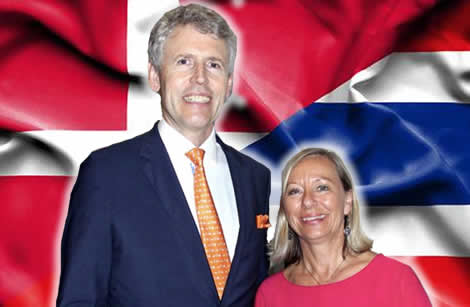The Danish ambassador held out the prospect of a resumption of trade talks between Thailand and the EU bloc after next year elections this week. He was speaking on the 160th anniversary of relations between the two Kingdoms. Any agreement will take time and the EU is currently in crisis while both Thailand and Denmark face a greater challenge than free trade – demographics
This week to celebrate over 160 years of international friendship with Thailand the Danish ambassador held out the prospect of the start of negotiations for a Thai EU trade deal after the election next year. Thailand and Denmark already have strong trading links and such a deal would take years to negotiate. In the meantime, the European Union faces a growing crisis with both countries, while they both enjoy growing relationships and trade, facing a demographic challenge.

The Danish ambassador to Thailand, Uffe Wolffheche, this week said that he was looking forward to a kick off in trade talks between Thailand and the EU next year. This would be following the elections set for February 2019. The objective of such talks would be to enhance free trade between the the second largest economic bloc in the world and Thailand. Thailand has a developing economy which has made a lot of progress in the last decades and is now the 8th biggest in Asia and the 2nd in the ASEAN community. Thailand currently chairs the ASEAN block of 10 Southeast Asia nations.
Thailand and Denmark are constitutional monarchies
The comments by the Danish ambassador follow a successful visit by Thai Prime Minister Prayut Chan-ocha to Germany in recent weeks and warming of relations between the EU bloc and the Thai government. As well as returning the country to democracy under Thailand’s new constitution next year, the Thai government has been undertaking initiatives on human trafficking and migrant labour, which are addressing key concerns raised by the EU, particularly in 2015. The comments also come in the week that Thailand and Denmark celebrate the 160th anniversary of relationships between the two countries, both if which are also constitutional monarchies.
Denmark is an ideal economic partner for Thailand offering technical know how and expertise
The Danish ambassador also underlined the positive cooperation between both countries on economic terms. The Danish economy is smaller than Thailand’s at $324 billion compared to $455 billion but its population is only 8.4% of that of the Kingdom of Thailand. Denmark is a highly developed economy with a GDP per capita of $56,307 while Thailand’s is only $6,593. Thailand is a developing economy that has reached a critical point requiring a new economic model to help the country overcome a demographic problem and what has been called in world economics, an income trap. This has resulted in the Thailand 4.0 programme launched by the Thai government in 2016, to move the economy to a high income, technology based level. Countries like Denmark and Germany can help with this. Denmark has vibrant technology and entrepreneurial sector looking for worldwide opportunities.
Danish men and Thai women moving from Kingdom to Kingdom with productive immigration
While Denmark, ranked by the UN as the 2nd best place in the world to live, has proved attractive to many Thai immigrants, most notable Thai women marrying Danish men, there has been a counter movement among Danish entrepreneurs to Thailand where opportunities are rife in a less developed and regulated economy. This has also included Danish companies. There are over 100 of them now in Thailand and they give valuable employment to over 50,000 Thai workers. These companies are involved in industry and services, where valuable know how is involved. Danish industry is renowned for its high level of professionalism and innovation. On the other hand, there is much that Thailand has to offer consumers and businesses in Denmark.
Thailand’s economic trade surplus with Denmark
Thailand, in fact, had a trade surplus with Denmark last year. It exported $13.7 billion worth of goods and services to the Kingdom of Denmark. Thailand imported over $10 billion in goods and services from Denmark.
Thai Danish milk – a success
Both countries have active programmes to combat climate change as well as other initiatives in education and environmental matters. One notable partnership has been a project between the two countries to develop a strong brand selling milk using premium Danish expertise.
Potential trade deal between Thailand and the EU could take years to negotiate and finalise
Uffe Wolffheche, the Danish ambassador, underlined Denmark’s desire to see a reduction in trade barriers between Thailand and the European Union in the future. He said he thought that talks between Thailand and the EU could begin after the election takes place and a democratically elected government is installed in Bangkok. The ambassador went to lengths to point out that the prosperity and development achieved by Thailand and the Kingdom of Denmark to date, had come about as the result of more open world trade. However, he underlined that talks between Thailand and the EU would involve addressing technicalities and the minutiae associated with all international trade deals. Such negotiations can sometimes take a number of years.
European Union and Denmark face a challenge balancing economic growth with citizens rights amplified by growing populist movements
It has to also be pointed out that the EU, in the last decade, has become more demanding and intrusive when it comes to foreign affairs and human rights in its dealings with Thailand and other, smaller economies. Thailand, while it has shown a determination to bring the country towards international standards and generate goodwill with the EU, has also at times stressed its own red lines with other international bodies such as the UN, when it comes to the country’s unique values and and national identity. This more aggressive posture by the EU has coincided with its insistence, within its own borders, on more congruence and harmonisation. This is leading to internal conflict at all levels.
European Union is in crisis
The bloc can be said, at the moment, to be in crisis over migration and what is seen as a democratic deficit by many working class people in European countries. This includes Denmark. While Denmark’s current government is still made up with more established parties, the People Party, a right wing populist party, representing working class and more nationalist Danes, is rising. Denmark has a history of being a very progressive country with an emphasis on consensus between political groupings and up to recently, a more liberal agenda. Most Danish governments are formed through responsible negotiation of coalitions between political parties.
People’s party – right wing populists are the 2nd biggest in Denmark and powerful kingmakers
In recent years, Danish politics has seen the rise of the right wing People’s Party which has demanded more action on stemming and controlling immigration into Denmark. In this, it has had some success. In the 2015 Danish general election, the left of centre Social Democratic Party lost power to a coalition even though it was largest party with over 26% of the vote. The right wing, populist, People’s Party was second with 21% but did not enter government instead retaining it role as influencer and kingmaker. Denmark, like the European Union, is facing a challenge. The key issue can be boiled down to the precedence of economic development or human rights, over core citizens rights, in the face of increased immigration. There is also the underlying problem of demographics which is essentially a social issue directly linked to economics. It is linked to the role of women in society and the birth rate. While Denmark has long been in the grip of this problem with empty, state of the art maternity units, it has seen a marginal improvement in the birth rate from 1.38 babies per woman (capable of child bearing) in 1983 to 1.71 today. But is it is not enough. Many Danes and even officials now realise that the progressive agenda undertaken in the 1950s was a mistake, at least in his area. In 2013, the government even introduced a programme for better sex education. It was called ‘Sex Week’ and encouraged young people to have more children at an appropriately younger age.
Vietnam and Singapore, both ASEAN members, already have free trade deals with the EU
Both Vietnam, still governed by one party communist rule, and the city state of Singapore, have already signed extensive free trade agreements with the European Union. Both are also ASEAN members. The Danish ambassador was asked by reporters about the US China trade war and its impact on Thailand. He said that Denmark, like Thailand supported free trade in principle because the country had an open and small economy that depended on more freedom to trade internationally.
Thailand’s biggest problem also – demographics
Thailand, often overshadowed by sensational news stories and misplaced stereotypes, has made impressive progress economically in the last five decades, even in the last two decades since the massive Asian financial crisis that devastated its prospects. Today, it is in a strong position with successive governments that, despite political upheavals, have prudently managed the country and its economy. Its biggest challenge today is not political instability but the demographics issue also with declining birth rates. By 2040, 25% of the Thai population will be over 65. Europe is facing the same crisis but EU politicians, particularly in Germany, are suggesting immigration as the solution. Thailand’s National Economic and Social Development Board called last week for the Thai government to provide for a range of financial incentives, as well as an extensive PR campaign, to encourage young Thai people to have more children. This is ultimately the best solution and involves social challenges. It has been shown that Thai women, as well as their Asian counterparts, are less likely to marry and have children as before because of a commitment to careers and increased economic opportunity. The solution will require less ideology and practical moves to create an environment where having children is rewarding.
Thailand is an ideal location for Danish firms targeting Southeast Asia and is home to many
There are currently ongoing trade negotiations between the ASEAN community and the European Union in relation to a free trade pact. Thailand, as current Chair of the bloc, is also pushing for more harmonisation and integration between ASEAN countries with more open trade. Danish companies, as well as their German counterparts, see the region as a growth area since despite the demographic challenge, there is still an emerging middle class which offers huge economic opportunities. For Danish firms, Thailand offers an ideal location as key vantage point from which to access the market in Southeast Asia.
Denmark associated with high standards and excellence among the Thai consumer market
Thailand and Bangkok has all the conveniences of a first world country, with an educated workforce and salaries that are well below that in the EU which also has higher levels of taxation. Thailand is also a country with a consumer population that has a uniquely strong interest in high quality goods and services. The fact that Denmark is also a monarchy plays a part in the perception of the country among Thai people. The country rates very highly, along with the United Kingdom and Switzerland, as a key centre of excellence and place that Thai people would like to visit.
Many Danes see opportunity in Thailand
Thailand is increasingly also seen, by Danish small business people, as an opportunity. Many Danish men come to start business operations in Thailand and even have purchased homes and apartments in kingdom as investments for the future. Thailand has become a ‘home from home’ for many wealthy European and Westerners in the last twenty years . The lower cost of world travel and advances in communications has made the world very much smaller.
Thailand in top 15% for ease in doing business
Thailand is a country that appeals to many western people for its unique way of living. In addition, Thailand has also been receiving praise from international bodies as an easy place to set up a small business. The country has surged in recent years within the World Bank’s index in this respect to an astonishing 26th in the world, putting it ahead of some EU countries and in the top 15% worldwide.


















